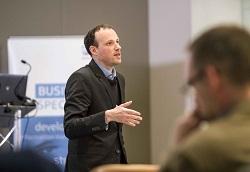You are here
- Home
- Thought Leadership
- Have we anything to fear from the ‘fourth industrial revolution’?
Have we anything to fear from the ‘fourth industrial revolution’?

A life full of copious amounts of leisure time with mundane tasks a thing of the past, or a world with mass unemployment which is ruled by machines?
Nobody is quite sure what the period we are entering, often referred to as the ‘fourth industrial revolution’, will mean for mankind but there will be significant changes to the lives of many as we progress through the 21st century.
Is it a positive, utopian prospect as we become a technology-driven ‘leisure society’? Or is there a far more troubling dystopian view that robots and corporations will dominate in a world of large-scale unemployment as both blue and some white collar jobs disappear?
Dr Charles Barthold, Lecturer in People Management, discussed both theories in ‘Preparing for Industry 4.0’, one of three presentations at a masterclass organised by OUBS at the Crowne Plaza in The City on Wednesday 2 May.
The future is not inevitable and it’s something humans will create. It’s only the beginning and there’s lots of scope to shape what will happen. The future will be what we make it to be and it will be shaped by debate and will require global buy-in through investment decisions and political support.
With artificial intelligence (AI) able to make strategic decisions, it could operate interconnected factories, rather than having a need for the current network of managers. ‘Smart’ organisations will be more efficient, providing better services to their customers. According to current patterns, inequality between countries as a whole is likely to decrease but also increase among individuals in a world of ‘smart’ technologies, organisations and cities. There is the assumption that low-skill jobs will be replaced; with our existing economic model disrupted, a new lifelong education system will be required to upskill workers for the new jobs created.
This vision of the future is sure to raise moral and ethical issues such as drones fighting our wars, using genetics to cure cancer, or even AI controlling our sacrosanct justice system as lawyers and even judges could become obsolete. All the three previous industrial revolutions led to conflicts – will this one be any different?
Dr Charles Barthold
Lecturer in People Management
‘The future of work 4.0: Disruptive technologies, opportunity or threat?’ Business Perspectives masterclass also featured presentations on the possibilities of a basic income and regulating blockchain led by Lecturer in Law Robert Herian from the OU Law School, as well as a discussion on some of the opportunities and challenges posed by potential economic ‘disruptions’.
